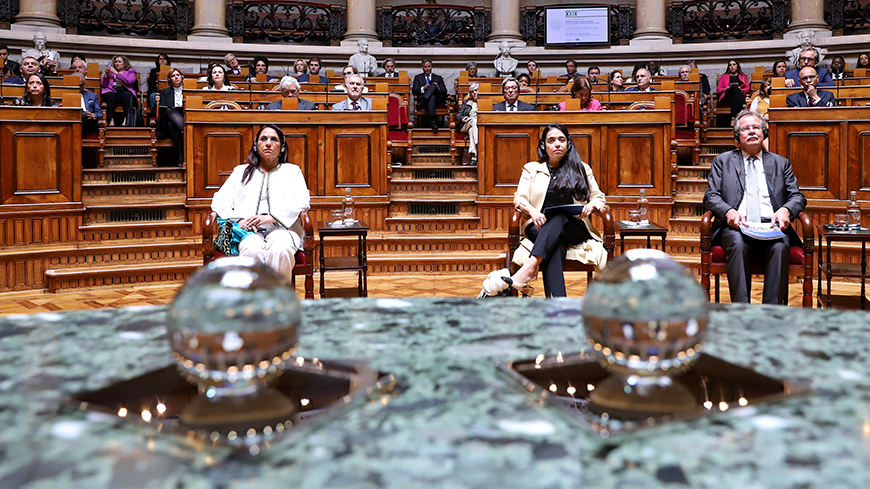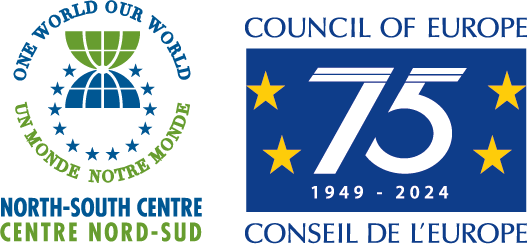The Award Ceremony of the 2023 North-South Prize of the Council of Europe, which took place on the World Day for Cultural Diversity for Dialogue and Development, on 21 May, celebrated two laureates for their exceptional commitment to the promotion of human rights and North-South solidarity.
The speeches during the award ceremony held in the Senate Room of the Portuguese Parliament – which included among others those of the laureates, H.E. Prof. Marcelo Rebelo de Sousa, President of the Republic of Portugal, Bjørn Berge, Deputy Secretary General of the Council of Europe, and Ambassador Francesca Camilleri Vettiger, Permanent Representative of Malta to the Council of Europe and Chairwoman of the Executive Committee of the North-South Centre – all took a moment to congratulate the efforts of individuals and organisations dedicating their life to the promotion of human rights, democracy, and the rule of law, and to remark on the importance of continuing to strive for these values and for North-South dialogue, particularly in a time when the world is facing considerable global challenges of common concern.
Ms Amina Bouayach was selected for her commitment to human rights, gender equality, and the prevention of torture in Morocco and in the African continent, including her political involvement in the abolition of the death penalty. This topic holds significant importance for the Council of Europe, which has been a pioneer in advocating for its abolition on both regional and global political agendas. Ms Bouayach’s efforts in strengthening civil society structures in the Mediterranean region, and North-South cooperation based on shared democratic values, further contribute to fostering dialogue and relations between the North and South Mediterranean, aligning with the North-South solidarity envisioned by the North-South Centre.
The Global Campus of Human Rights was selected for its crucial work in ensuring a high-quality Human Rights education in various regions of the world, and for fostering North-South dialogue among a community of scholars, students, and legal experts to promote human rights and democratic values. The organisation was represented at the ceremony by its President, Judge Verónica Gómez, and its Secretary General, Prof. Manfred Nowak. The work of the Global Campus of Human Rights, being a global network of universities worldwide, emphasises the importance of providing human rights education to students and incentivising youth perspectives when tackling human rights issues, reflecting the importance given by the North-South Centre to youth participation in its activities.
Inspired by the work of Ms Bouayach and the Global Campus of Human Rights, the launch of the North-South Dialogues Round Table, which took place on 20 May, addressed the theme “Prospects and interregional cooperation for the abolition of the death penalty”. During the panel, the speakers were able to bring to light legal and socio-political perspectives on the abolition of the death penalty in various regions of the world, including Europe, Latin America, Africa, and the MENA region. The participation of government representatives and members of the Executive Committee of the North-South Centre of the Council of Europe in the discussion further strengthened open dialogue between countries of the North and South Mediterranean and Sub-Saharan Africa. As the Round Table took place at Universidade Católica Portuguesa in Lisbon, it engaged university students and the academic community in the discussion, re-emphasising the North-South Centre’s mission to include the youth perspective when addressing contemporary global challenges.
As a panellist in the Round Table, Judge Gómez introduced the Latin American perspective on the legal interpretation and abolition of the death penalty. Her intervention complemented Ms Bouayach’s discussion on the Moroccan and North-African context and the African legal and socio-political dimension introduced by Prof. Ntandokayise Ndlovu. Mr Sébastien Potaufeu presented the abolition of the death penalty from a European perspective in the framework of the Council of Europe’s activities.
The North-South Prize also coincided with the meeting of the Executive Committee of the North-South Centre, which welcomed Lebanon as new associate member, decided in the new board for the next two years - renewing Malta as the Chair and Morocco as Vice-Chair - and deliberated, among other topics, cooperation with African countries. The afternoon meeting counted on the presence of the Deputy Secretary General of the Council of Europe and of the laureates of the 2023 North-South Prize of the Council of Europe, which provided an opportunity for exchanges with the members of the Executive Committee on the state of North-South relations and their impact on human rights.
The award ceremony demonstrated international engagement from North and South, counting participants of 46 different nationalities representing civil society, governments, parliamentarians, and local and regional authorities.
Overall, the Round Table, North-South Prize, and Executive Committee meetings provided various platforms for dialogue and exchanges between North and South which also reinforced the commitment to the Council of Europe’s values of human rights, democracy, and the rule of law, as well as to the importance of including a youth perspective in this context.
More information about the Round Table
More information about the Award Ceremony of the 2023 North-South Prize of the Council of Europe
Media Gallery of the Award Ceremony




